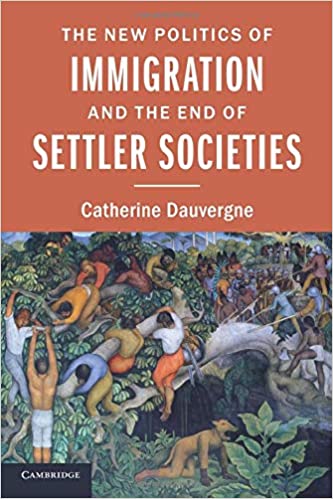New SI Publication : A New Politics? Symposium on Dauvergne’s The New Politics and the End of Settler Societies at International Migration https://onlinelibrary.wiley.com/toc/14682435/2020/58/6
#immigration #politics Learn more about this SI here ! https://twitter.com/MiReKoc/status/1339186807934771206
https://twitter.com/MiReKoc/status/1339186807934771206
#immigration #politics Learn more about this SI here !
 https://twitter.com/MiReKoc/status/1339186807934771206
https://twitter.com/MiReKoc/status/1339186807934771206
This Special Issue presents articles that empirically and theoretically respond to Catherine Dauvergne's 2016 book The New Politics and the End of Settler Societies: https://bit.ly/387sX6h , which documents the evolution of immigration politics in the Global North.
Dauvergne argues that we witness a New Politics of immigration “[. . .] characterized by legalization, rapid change, defiance of partisan expectations, a new worldwide ‘us’ and ‘them’ divide, existential fear, and an unprecedented place on the central political stage ” (2016, 8).
Her book also explores avenues to get out of the current “policy paralysis” that characterizes state’s responses to the global displacement crisis and points to the need for a rethinking of the concepts that organize global migration governance.
A motivation for this SI was to examine Dauvergne’s claim that there is now so much convergence in immigration politics and policies that it is counterproductive to differentiate “traditional immigration societies” or “immigrant settler societies” from European countries
[Pausing here to state the obvious: this is not at all an argument that denies the continuation of settler colonialism in countries like Canada, Australia and the United States and the linkages between global migration governance, imperialism and neo-colonialism]
This argument challenges #migration studies: a classical foundation of migration research is that immigrant settler societies (CDN, AUS, NZ, the U.S.) are characterized by qualitatively different immigration-related policies and particular immigration politics (usually "Europe")
To caricature a large body of scholarship (sorry!): immigration settler societies are supposed to have policies that are more welcoming to immigrants, Their immigration politics are expected not to be too salient. They implement more expansive and inclusive immigration policies.
For Dauvergne, this is no longer the case. Both in terms of politics but also in terms of policy, we see immigrant settler societies and the other group of countries converge towards more "mean-spirited" policies, more political salience and less protection for immigrants.
Authors of the SI verified this claim, using novel data and expanding the range of cases and issues explored in the book: https://bit.ly/387sX6h
On Canada, Yasmeen Abu-Laban argues that settler‐colonial foundations continues to impact three areas relevant to the comparative study of migration: 1) national discourse; 2) land and forms of social power; and 3) politics and forms of solidarity. https://doi.org/10.1111/imig.12685
On Spain and the U.S., @lunavives explore the impact of externalization, militarization, detention and deportation on unaccompanied migrant children and confirms Dauvergne’s argument https://doi.org/10.1111/imig.12704
On Canada, @AntjeEllermann and @gorokhovskaia document the erosion of permanent immigration, by pointing to the rise in temporary schemes and two-steps migration programs as well as of policies that open the potential for loss of refugee status https://doi.org/10.1111/imig.12645
@mireille_paquet documents how the Dauvergne's New Politics contributes the emergence of two types “subnational migration states”: 1) the “economic subnational migration state” ( CND and AUS ) and 2) the “access subnational migration state” (U.S). https://doi.org/10.1111/imig.12649
Regarding the U.S. Matthew Wright and Morris Levy rebuke part of Dauvergne’s argument by showing that public opinion about immigration is generally positive and that Americans have actually become more pro‐immigrant in recent years https://doi.org/10.1111/imig.12660
The SI close by a text by Dauvergne on immigration politics and governance since 2015. While she nuances her arguments, she shows that increasing salience, legalization and urgency in politicizing immigration remain central features globally https://doi.org/10.1111/imig.12739
This SI came out of a symposium where students and researchers came together to think about contemporary immigration politics. Thanks to @SSHRC_CRSH for supporting the event. Merci aussi au @FRQSC et au @cridaq pour leur participation à ce projet.

 Read on Twitter
Read on Twitter


